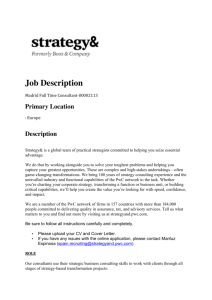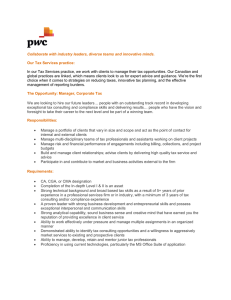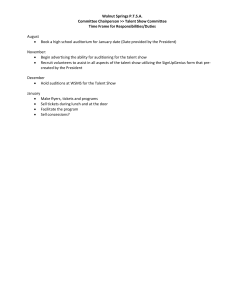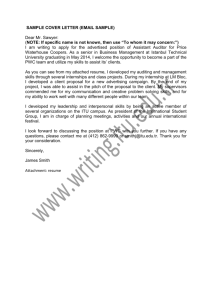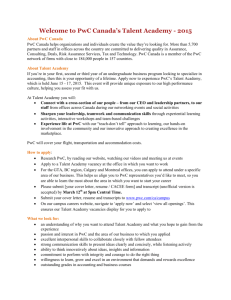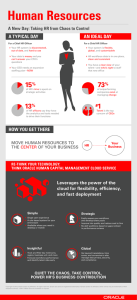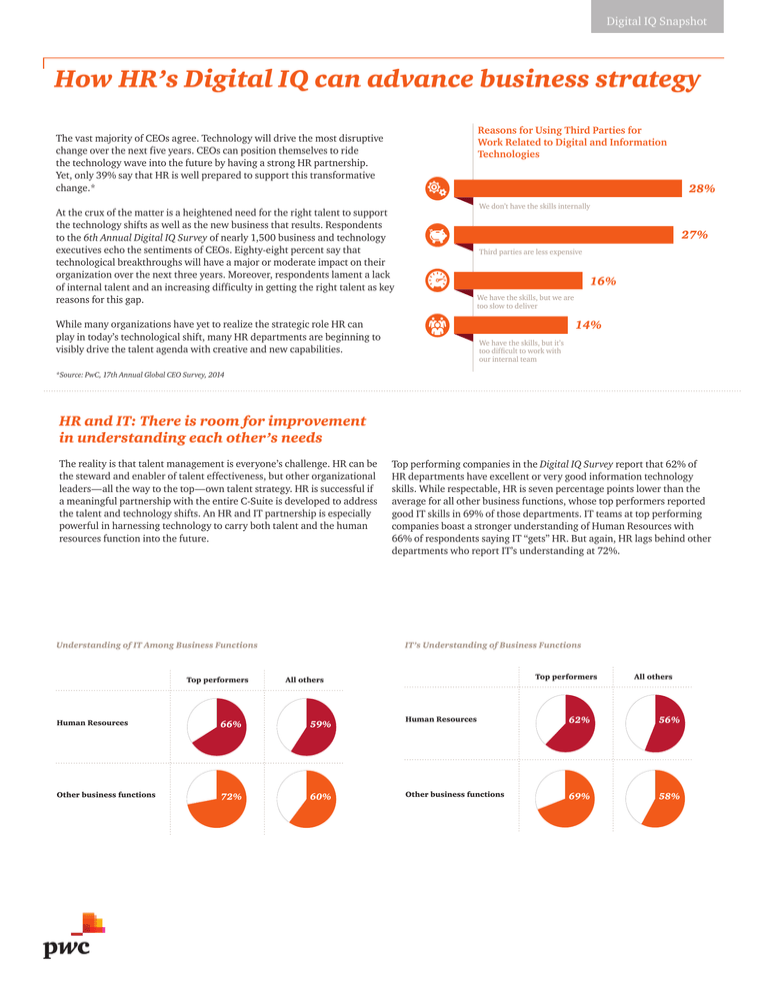
Digital IQ Snapshot
How HR’s Digital IQ can advance business strategy
Reasons for Using Third Parties for
Work Related to Digital and Information
Technologies
The vast majority of CEOs agree. Technology will drive the most disruptive
change over the next five years. CEOs can position themselves to ride
the technology wave into the future by having a strong HR partnership.
Yet, only 39% say that HR is well prepared to support this transformative
change.*
28%
We don’t have the skills internally
At the crux of the matter is a heightened need for the right talent to support
the technology shifts as well as the new business that results. Respondents
to the 6th Annual Digital IQ Survey of nearly 1,500 business and technology
executives echo the sentiments of CEOs. Eighty-eight percent say that
technological breakthroughs will have a major or moderate impact on their
organization over the next three years. Moreover, respondents lament a lack
of internal talent and an increasing difficulty in getting the right talent as key
reasons for this gap.
27%
Third parties are less expensive
16%
We have the skills, but we are
too slow to deliver
14%
While many organizations have yet to realize the strategic role HR can
play in today’s technological shift, many HR departments are beginning to
visibly drive the talent agenda with creative and new capabilities.
We have the skills, but it’s
too difficult to work with
our internal team
*Source: PwC, 17th Annual Global CEO Survey, 2014
HR and IT: There is room for improvement
in understanding each other’s needs
The reality is that talent management is everyone’s challenge. HR can be
the steward and enabler of talent effectiveness, but other organizational
leaders — all the way to the top — own talent strategy. HR is successful if
a meaningful partnership with the entire C-Suite is developed to address
the talent and technology shifts. An HR and IT partnership is especially
powerful in harnessing technology to carry both talent and the human
resources function into the future.
Understanding of IT Among Business Functions
Top performers
Top performing companies in the Digital IQ Survey report that 62% of
HR departments have excellent or very good information technology
skills. While respectable, HR is seven percentage points lower than the
average for all other business functions, whose top performers reported
good IT skills in 69% of those departments. IT teams at top performing
companies boast a stronger understanding of Human Resources with
66% of respondents saying IT “gets” HR. But again, HR lags behind other
departments who report IT’s understanding at 72%.
IT’s Understanding of Business Functions
Top performers
All others
Human Resources
66%
59%
Other business functions
72%
60%
All others
Human Resources
62%
56%
Other business functions
69%
58%
Top performers integrating technology into
daily operations
There is much evidence to show that HR leaders are working in new and
innovative ways to strengthen their ability to advance the organization’s
strategic talent goals. In fact, we see HR as one function that is riding the
Big Data wave pretty strongly. For example, it is not unusual to see HR
analytics as an integral part of HR’s day-to-day operations, especially among
top performers. What starts as a side project for one or two people to dive
deeper into attrition and mobility can often turn into the creation of an HR
Workforce Analytics and Engagement organization.
Top Performers Use Analytics in HR More than Others
Top Performers
Top performers are gaining an edge with predictive workforce analytics that
empower leaders with information to woo and retain the best candidates.
What’s more, the right data can also help companies win-over the existing
workforce with better work assignments, more targeted rewards and benefits
and positively shift the employee engagement equation
All others
70%
59%
In addition, more and more organizations are embracing workforce
management solutions that are cloud-based. These decisions are often
led by HR departments who as a result are becoming more savvy about
technology and solutions that can help them be more effective. However,
according to PwC’s 2014 HR Technology Survey, nearly one-third (28%)
of respondents felt their business was not fully prepared for the move to
the cloud.* Understanding and planning for the level of transformation
required is critical. HR is hiring and building capabilities within their own
organization to manage and drive technology decisions.
Source: PwC, HR Technology Survey, 2014
Re-thinking Collaboration and Mobility
Investments
Year Over Year Investments
in HR-Related Technologies
The flow of communications between employees is the vital life force of
any enterprise. It was thought that social platforms and collaboration tools
were the key to enabling an increasingly global and mobile workforce, yet
investments in this area have remained stagnant. Even though last year
11% of respondents said they would boost investments in virtual meeting
and collaboration technologies, the number of those investing actually
ticked down slightly. Investments in mobile technology for employees have
dropped and investments in internal social media have flat-lined. This is a
good opportunity for senior leaders to step back to better understand how to
leverage these technologies to improve how employees work and from an HR
standpoint, how to facilitate a connected workforce.
6th Annual Digital IQ Survey | 5th Annual Digital IQ Survey
34%
36%
Virtual Meeting and Collaboration Tools
30%
30%
HR executives understand that technology is transforming the enterprise and
there are many examples that show change is happening, but is the change
fast enough? In the age of digital, time and speed to market are competitive
advantages.
Social Media for Internal Communication
HR has the opportunity to not only be the voice of the employees for
traditional HR activities but to also be an advocate for technology. A
strong partnership between HR and IT can be the difference in unlocking
the power of technology.
Mobile Technology for Employees
37%
52%
Comparison of all responses from the 5th and 6th Annual Digital IQ Surveys for the
question: Which of the following technologies are you currently investing in?
To have a deeper conversation about how this subject may affect your business, please contact:
Chris Curran
Principal and Chief Technologist
214 754 5055
christopher.b.curran@us.pwc.com
Jean E. Lee
Principal, People & Change Advisory
408 817 5776
jean.e.lee@us.pwc.com
www.pwc.com/us/digitaliq
© 2014 PricewaterhouseCoopers LLP, a Delaware limited liability partnership. All rights reserved. PwC refers to the US member firm, and may sometimes refer
to the PwC network. Each member firm is a separate legal entity. Please see www.pwc.com/structure for further details.This content is for general information
purposes only, and should not be used as a substitute for consultation with professional advisors.

